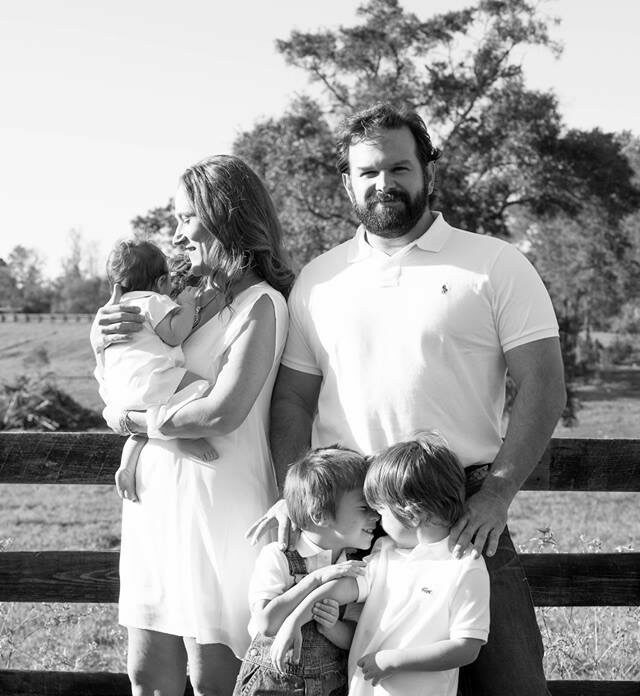 Today we’d like to introduce you to Joe Gulley. Them and their team share their story with us below:
Today we’d like to introduce you to Joe Gulley. Them and their team share their story with us below:
The story of Ruby Cattle Company starts with the story of the four Joes. Born to a blacksmith and farmer in Camden, Texas, Joe Sr. earned money at an early age by cutting weeds for the local sawmill (for five cents a day). He went on to receive a degree in chemical engineering from Sam Houston State University and made a career with Texaco, from which he retired after managing the Port Neches refinery.
In the 1950s, Joe Sr. and his wife Betty purchased land that bordered the Alabama Coushatta Indian Reservation that would become a core component of RCC beef production. Joe Jr. (or Doc), grew up clearing and planting Coastal on much of that land. Doc attended and received his DVM from Texas A&M College of Veterinary Medicine in the 1980s. Over his lifetime, Doc and his wife Imelda have added to the land and focused on Doc’s passions for plant and animal nutrition and herd stewardship. Joe III, grew up on the family ranch building fence, baling hay, and working cattle.
Joe III went on to receive his JD from Harvard Law School. After practicing law in Houston for several years, Joe III and his wife Andi also began adding to the land around the family farm. In 2005, Joe III and Doc formed Ruby Cattle Company LLC with the goals of producing high quality Angus beef and preserving the agrarian way of life.
Whether it’s chopping weeds, planting grass, or building fence, the lessons learned are life-long, and that’s why farmers and ranchers epitomize independence and self-reliance. Like many, the agricultural industry is facing pressure to aggregate and conglomerate, but lost in that process is the small family farm. Also lost to some extent is the individual care that animals receive from a family operation.
At RCC, we are still family owned and managed. Our herd genetics have been a focus of the Gulley family for generations, with each addition or change carefully studied and contemplated.
Like all ranchers, we are invested in our herd health because there is a financial incentive to help our cattle be successful, but we are also devoted to caring for and improving our herd for what Joe IV (a.k.a. Bo, age 6 and his brothers John & Caleb age 10) represents–the future.
It is amazing sometimes to think about the generational devotion it takes to build a ranch, but it goes hand in hand with the generational care and focus we have given our herd. We truly believe our cattle are special. We go to great lengths to ensure that they have as peaceful and productive a life on our ranch as possible–from the time they are calved until the time they leave to be processed, we personally care for and tend them.
Can you talk to us a bit about the challenges and lessons you’ve learned along the way. Looking back would you say it’s been easy or smooth in retrospect?
There are always obstacles and challenges. As a farmer (all good ranchers are really grass farmers too), you live a lesson in providence. You put out fertilizer and it doesn’t rain, or rains too much. You fill a barn with hay and it burns down, or the roof gets blown off in a hurricane. I could go on–but the point is most farmers learn to work hard and try their best, but also learn to trust in God’s providence.
The ranch has historically been a producer–which means we raised calves and sold them to third party backgrounders at weaning. However, in an effort to attain a slightly more stable and sustainable market, several years ago we changed directions and began selling straight to the consumer. This has many benefits. It allows us to keep the animals under our care for longer–the only time the beef you buy leaves the ranch is to go to the processor. This means we can better ensure the quality of the product, we get to see instant feedback on herd decisions, and we are able to utilized the enormous amounts of organic matter that fats produce during the time they are growing. But there have been new challenges. Perhaps the largest struggle has been finding a reliable processor and getting our grass fed label.. It was a very good day when we found our current processor and had our label approved.
The grass fed label is extremely important. Most consumers think in terms of organic because they are used to produce. In fact, the organic label for beef is a bit confusing, because much of the organic beef out there is actually grain fed. But for cattle, which have a rumen, the grass fed designation is much more important. Ruminants are designed to eat fiber–something humans cannot eat. That is why cattle are the only upcycler among the big three animal proteins. It takes more human edible food to produce a pound of pork (by triple) or chicken (double) than what’s produced (think corn and other grains and carbohydrates that humans can utilize). That’s not true for cattle.
On average, it takes 0.7 pounds of human edible food to produce a pound of beef. And for truly grass fed (and grass finished) beef, there is zero human edible food utilized. In addition, grass fed and grass finished beef (like RCC) is much healthier for the consumer. In simple terms, feeding carbs to cattle produces quick and highly efficient fat (or finish), but it also causes the type and quality of their fat to change for the worse. Grass fed beef typically has a lower fat content, more omega-3 and omega-6 fatty acids, more antioxidant vitamins such as vitamin E, higher levels of CLA (conjugated linoleic acid), among other benefits. Because the grass fed designation is not as regulated as the term organic, it’s important to know the producer.
All of our beef at Ruby Cattle Company, is grass fed, grass finished, Angus beef. But that’s the great thing about local producers–we love to have visitors so come see for yourself. We typically have a couple tours a year, and love talking grass, cows and beef.
As you know, we’re big fans of Ruby Cattle Company. For our readers who might not be as familiar what can you tell them about the brand?
RCC sells grass fed, grass finished Angus beef. We have a storefront in the newly renovated historic Livingston Drug building at 413 N. Washington Avenue in downtown Livingston. We also have an online store and offer free delivery on most orders to all the surrounding areas, including Houston, We attend the River Oaks District farmers market at 4444 Westheimer Road on the third Sunday of each month.
Our focus is on producing a product that is healthier and more sustainable than alternatives, with the highest quality possible. We are a local, family owned ranch that produces grass fed and grass finished Angus beef. We believe, you’ll understand why we think healthy has never tasted so good when you give our beef a try.
Contact Info:
- Website: www.RubyCattleCompany.com
- Instagram: https://www.instagram.com/rubycattlecompany/
- Facebook: https://www.facebook.com/rubycattlecompany/


















